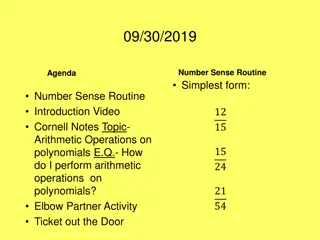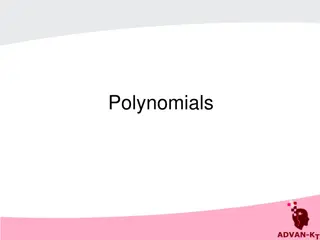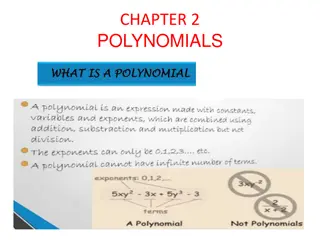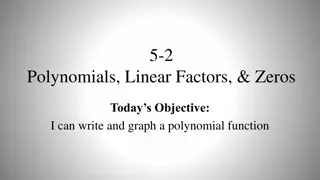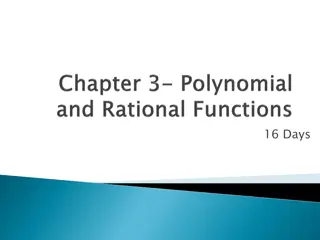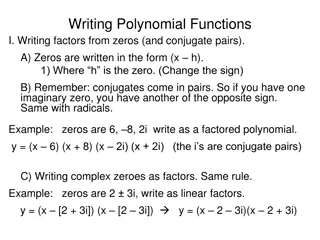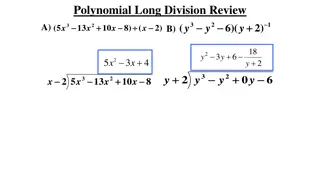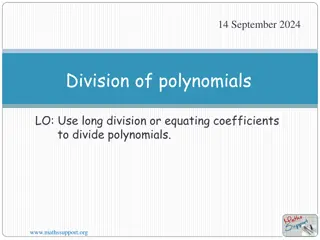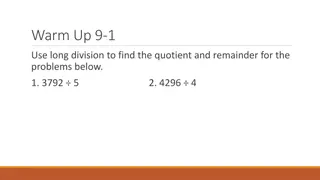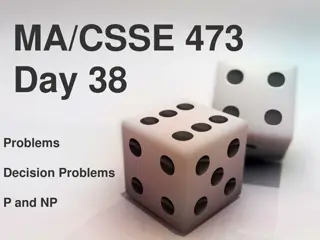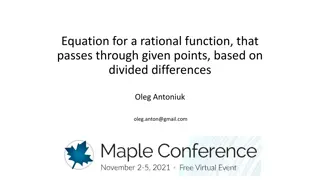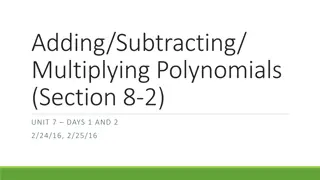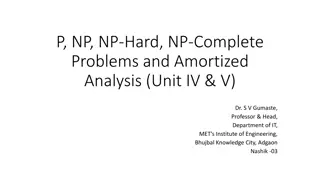Understanding Polynomial Functions with Real Zeros
Learn how to identify and write polynomial functions that include real zeros, find zeros of given functions, explore the Fundamental Theorem of Algebra, and apply the Number of Zeros Theorem. Practice writing polynomial functions satisfying specific conditions.
Download Presentation

Please find below an Image/Link to download the presentation.
The content on the website is provided AS IS for your information and personal use only. It may not be sold, licensed, or shared on other websites without obtaining consent from the author. Download presentation by click this link. If you encounter any issues during the download, it is possible that the publisher has removed the file from their server.
E N D
Presentation Transcript
Writing a Polynomial Function that Includes the Real Zeros Lesson 3.3 day3 Notes
Learning Goal Today you will learn to: Identify the real zeros of a polynomial given the function in factored form Write a polynomial function that satisfies a set of given conditions, including real zeros.
Finding the zeros of a given function For each polynomial function below, find all zeros and their multiplicities: ? ? = ? 23?2 7 Set each factor equal to zero and solve for x. ? 2 = 0 ? = 2(has multiplicity of 3) ?2 7 = 0 ?2= 7 ? = 7
Finding the zeros of a given function Now you try: Ex1) ?(?) = 3? ? 42? + 3 ?2 1 ? = {0,4 ??? ???????????? ?? 2, 3,1, 1} Ex2) ? ? = ? ? + 74?2+ 8 ? = {0, 7 ??? ???????????? ?? 4,2? 2, 2? 2}
Fundamental Theorem of Algebra The Fundamental Theorem of Algebra states that every function defined by a polynomial of degree 1 or more has at least one complex zero. Assuming that f(x) has degree n gives the formula ? ? = ? ? ?1 ? ?2 ? ?3 .(? ??) Each of these factors leads to a zero of f(x) so f(x) has n zeros at ?1,?2,?3, ??
Number of Zeros Theorem The Number of Zeros Theorem states that a function defined by a polynomial of degree n has at most n distinct zeros. How many zeros will the following polynomial have? ? ? = ?3+ 3?2+ 3? + 1 Answer: 3 zeros
Writing Polynomials Functions that Satisfy Given Conditions Find a polynomial function, f(x) of degree 3 with real coefficients that satisfies the given conditions: Ex1) ????? ?? 3, 2 ??? 5; ? 1 = 6 ? ? = ? ? + 3 ? + 2 ? 5 ? 1 = ? 1 + 3 1 + 2 1 5 6 = ? 2 1 6 6 = 12? ? = 1 2 Therefore ? ? = 1 ? ? = 1 2? + 3 ? + 2 ? 5 2?3+19 2? + 15
Writing Polynomials Functions that Satisfy Given Conditions Find a polynomial function, f(x) of degree 3 with real coefficients that satisfies the given conditions: Ex 2) 4 ?? ? ???? ?? ???????????? 3; ? 2 = 24 ? ? = ? ? 43 ? 2 = ? 2 43 24 = ? 23 24 = 8? ? = 3 Therefore ? ? = 3 ? 43 ? ? = 3?3 36?2+ 144? 192
Writing Polynomials Functions that Satisfy Given Conditions Now You Try: Find a polynomial function, f(x) of degree 3 with real coefficients that satisfies the given conditions: Ex 3) ????? ?? 1,3 ??? 4; ? 2 = 18 ? ? = 3 ? + 1 ? 3 ? 4 ? ? = 3?3 18?2+ 15? + 36 Ex 4) Zeros o? 0 ??? 2 ?? ? ???? ?? ???????????? 2; ? 1 = 3 ? ? =1 ? ? =1 3? ? + 22 3?3+4 3?2+4 3?
Summary So far, you ve learned how to find rational roots of a polynomial using the Rational Root Theorem and Factor Theorem (listing out all possible rational roots and then testing them using Synthetic Division). You ve learned how to find rational, irrational and non-real complex roots when at least one root is given. (complex conjugates and synthetic division) You ve learned how to find roots when the polynomial is given in factored form and the meaning of multiplicity of roots. You ve learned how to write a polynomial of given degree when provided the zeros and at least one point on the graph. With the next lesson, you will learn how to write polynomial functions given non-real complex zeros (very crafty, you are!)
Practice you must, or the force will not be with you on the next test! HW 3.3 #7, 8, 48-60 evens




